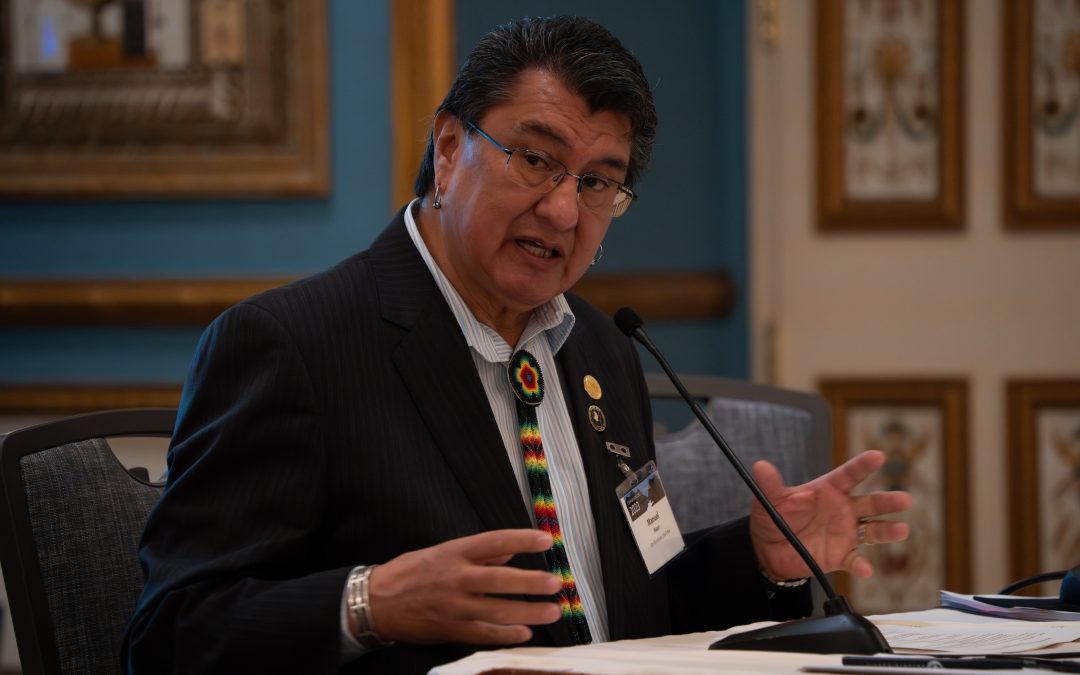LAS VEGAS — For tribal nations in the Colorado River Basin, repairing a century of exclusion is a crucial step in planning for the river’s future. A new proposal could grant them a permanent seat at the table.
Collectively, the 30 tribal nations in the basin have rights to about 26% of the Colorado River’s average flow, but states and the federal government have repeatedly left them out of major decisions about how the river’s water is stored, divided up and distributed. This month, tribal representatives from around the Colorado River Basin took the mic at the biggest basin gathering of the year with a focus on correcting historical wrongs and asserting their rights to water.
“We are still not directly engaged in the process that determines [the river’s] future,” Amelia Flores, chairwoman of the Colorado River Indian Tribes, four tribes with land in Arizona and California said at the 2023 Colorado River Water Users Association conference in Las Vegas. “… Our livelihoods and our traditions have no voice. We must do better.”

Tribal water concerns have been addressed through legislation, court decisions, contracts and more through the decades. However, tribal leaders say they are informed of decisions about how the river is managed, instead of being included in the decision-making process.
State and federal leaders did not include tribes in the creation of the 1922 Colorado River Compact, which forms the foundation of how the river’s water is managed, despite federal recognition of tribal water rights in years prior. As recently as 2007 and 2019, state and federal partners developed new rules for managing the river in response to prolonged drought, but again, tribes were not included.
As basin officials plan for the river’s future after 2026, when the current rules expire, tribal representatives say history cannot repeat itself. “I’ve heard all the arguments as to why it’s not feasible to have representation of tribes at the negotiation table with the state and federal governments,” Flores said. “I’m not buying it.”
For the first time, six tribal nations are negotiating an agreement with four basin states and the federal government to give them a permanent voice at one important table. In 2022, tribes with land in the Upper Basin — Colorado, New Mexico, Utah and Wyoming — began meeting with the Upper Colorado River Commission, a governance body made up of federal and Upper Basin state officials.
“This relationship that we’ve formed is very, very important on how the Upper Basin moves as a collective,” said Lorelei Cloud, acting chairwoman of the Southern Ute Indian Tribe, which has land in southwestern Colorado. “We’ve gotten to a point now where we are sharing information with each other, and that’s been monumental.”
The draft agreement would formalize meetings between tribal, state and federal governments, regardless of any future changeover in leadership. The commission will consider and possibly vote on the agreement in February, according to Chuck Cullom, the commission’s executive director, who called the agreement “historic” but overdue. “It’s something we should’ve been doing much earlier,” Cullom said.

The river commission and tribal representatives highlighted the new agreement during a Dec. 13 meeting at the Las Vegas conference. The meeting marked the 75th anniversary of the commission and the second time all six tribes were invited to participate. The first was in 2022.
Tribal representatives from across the basin voiced their main goals and concerns in discussions related to water policy, agriculture and the river’s future at the conference, which brings together all of the key players in the Colorado River Basin each year.
Unused water is a key issue for tribal leaders. About a dozen nations across the Colorado River Basin, including the Ute Mountain Ute Tribe, which also is in southwestern Colorado, still had unquantified water rights as of 2021.
Settling these rights for the Ute Mountain Ute Tribe needs to happen before 2026, Chairman Manuel Heart said. The tribe has completed the legal process to quantify the amount of water tied to its rights in Colorado but not in New Mexico and Utah.
In some cases, tribes may have quantified water rights but lack the infrastructure to deliver it to homes, businesses and farms. Both tribes in Colorado have rights to water they currently can’t access in Lake Nighthorse Reservoir near Durango.
That water flows downstream to Lake Powell and the Lower Basin — where water users can get paid to let it flow by their lands, according to Upper Basin officials. Tribes, however, aren’t compensated for their unused water from settled water rights.
“I’d really like to see full support from all seven states to say yes, we do support tribes,” Heart said. “There’s a lot of water that’s in the basin that’s unaccounted for, that they’re not even compensated for.”
The Upper Colorado River Commission is trying to estimate just how much of this water flows downstream to benefit the Lower Basin, officials said.
“The last 20 years have been really hard for all of us, both Upper and Lower Basin. Every person,” Heart said. “Demand, today, is at a high level. We can’t meet that demand.”
The basin needs to look at new opportunities and partnerships, and work within the limits of the river, several tribal leaders said. “We should all have the fundamental right to access clean water,” Heart said. “We should all have the right to use these waters based on what our needs are.”


 Print
Print